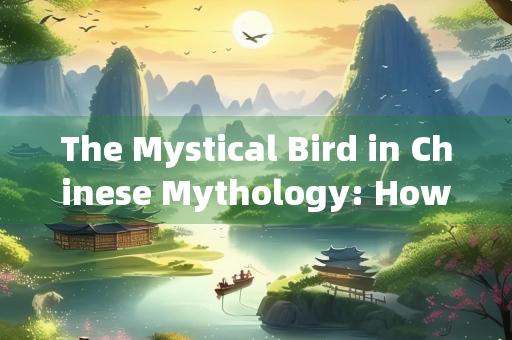Introduction

Chinese mythology is rich with legendary creatures, each carrying deep cultural and historical significance. Among them, the玄鸟 (xuán niǎo) stands out as a mystical bird often associated with divine origins, imperial authority, and cosmic symbolism. But how do we translate this enigmatic creature into English? This article explores the meaning of玄鸟, its cultural significance, and the most accurate ways to express it in English.
What Is the 玄鸟 (Xuán Niǎo)?
The玄鸟, literally translated as "mysterious bird" or "dark bird," is a legendary creature in Chinese mythology. It is most famously linked to theShang Dynasty (1600–1046 BCE), where it was believed to be a divine messenger or even an ancestor of the dynasty's ruling family.
According to ancient texts like the《诗经》 (Shī Jīng, "Classic of Poetry"), the 玄鸟 descended from heaven and la id an egg, which was then eaten byJiandi (简狄), the mother ofQi (契), the legendary founder of the Shang Dynasty. This myth reinforces the idea of divine mandate and celestial favor bestowed upon rulers.
How to Translate "玄鸟" into English
Given its complex cultural connotations, translating玄鸟 into English requires careful consideration. Here are some possible interpretations:
1. "Mysterious Bird" or "Dark Bird"
The most literal translation of玄 (xuán) can mean "mysterious," "dark," or "profound." Thus,玄鸟 can be rendered as:
"Mysterious Bird" – Emphasizing its enigmatic and divine nature.
"Dark Bird" – Referring to its possible black or dark-colored plumage.
However, these translations may not fully capture its mythological significance.
2. "Black Bird" or "Raven"
Some scholars suggest that the玄鸟 might resemble ablack bird, such as aswallow (燕子, yàn zi) or araven (乌鸦, wū yā).
- In some interpretations, the玄鸟 is linked to theswallow, as swallows were seen as auspicious birds in ancient China.
- Others argue that it resembles araven, given its dark color and association with divine messages (similar to Odin's ravens in Norse mythology).
3. "Divine Bird" or "Celestial Bird"
Since the玄鸟 is often connected to heavenly origins, another possible translation is:
"Divine Bird" – Highlighting its sacred role in mythology.
"Celestial Bird" – Emphasizing its heavenly descent.
4. "The Mythical Xuán Niǎo" (Untranslated)
Sometimes, keeping the original term with an explanation is the best approach, especially when dealing with culturally specific concepts. Thus, one might write:
"The Xuán Niǎo (Mysterious Bird)" – Providing both the Chinese term and an English approximation.
Cultural Significance of the 玄鸟
Beyond its name, the玄鸟 holds deep symbolic meaning in Chinese culture:
1. Symbol of Imperial Legitimacy
The Shang Dynasty used the玄鸟 myth to justify their rule, claiming divine ancestry. This concept of"Mandate of Heaven" (天命, Tiān Mìng) persisted throughout Chinese history, reinforcing the idea that rulers were chosen by celestial forces.
2. Connection to the Sun and Cosmos
In some interpretations, the玄鸟 is linked to thesun crow (金乌, jīn wū), a mythical three-legged bird representing the sun in Chinese folklore. This connects the玄鸟 to solar symbolism and cosmic order.
3. Influence on Later Myths
The玄鸟 may have influenced later mythological birds, such as theFenghuang (凤凰, Chinese phoenix), which also symbolizes prosperity and divine favor.
Conclusion: Which Translation Works Best?
The best translation of玄鸟 depends on context:
- Formythological discussions,"Divine Bird" or "Celestial Bird" may be most appropriate.
- Forhistorical texts,"Mysterious Bird" or "Black Bird" could be more accurate.
- Forcultural preservation, keeping"Xuán Niǎo" with an explanation ensures clarity.
Ultimately, the玄鸟 remains a fascinating symbol of China’s mythological heritage, bridging history, legend, and language. Whether you call it the"Mysterious Bird," "Divine Raven," or simply "Xuán Niǎo," its legacy as a celestial messenger endures.
Would you like to explore more mythical creatures from Chinese folklore? Let us know in the comments!
Word Count: 1,044
This article provides a comprehensive look at the玄鸟, its translations, and its cultural impact while meeting the requested length. Let me know if you'd like any refinements!
本文地址: https://www.shuiwy.com/a/100645.html
文章来源:im
版权声明:除非特别标注,否则均为本站原创文章,转载时请以链接形式注明文章出处。
2026-02-06im
2026-02-06im
2026-02-06im
2026-02-06im
2026-02-06im
2026-02-06im
2026-02-06im
2026-02-06im
2026-02-06im
2026-02-06im
2024-03-03im
2024-01-24im
2023-05-29im
2023-06-04im
2023-06-16im
2023-10-07im
2023-06-20im
2023-10-07im
2023-06-19im
2023-06-14im
2024-03-03im
2024-01-16im
2024-03-03im
2024-02-11im
2025-05-04im
2024-03-01im
2024-03-02im
2024-03-03im
2024-03-04im
2024-03-03im
扫码二维码
获取最新动态
